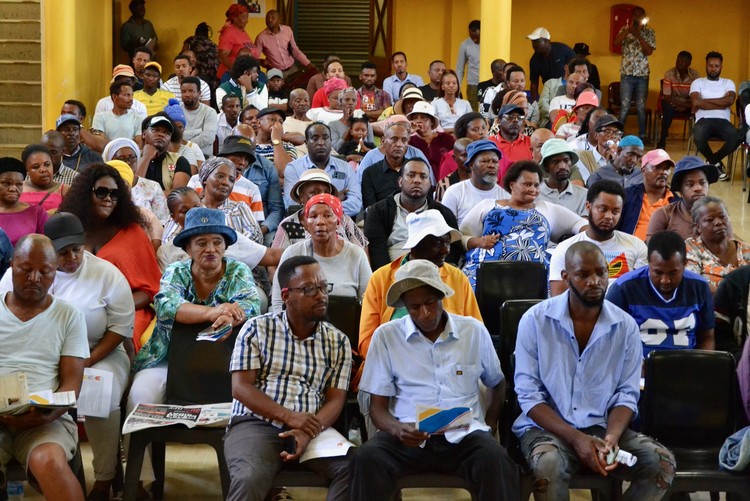Spaza shop landlords shocked by R2,200 permit fee
Nelson Mandela Bay Municipality is scrambling to legalise residential based enterprises
Residents, landlords and immigrant spaza shop owners at a community meeting at Babs Madlakane Hall in KwaNobuhle, Kariega, on Thursday. Photo: Thamsanqa Mbovane
Hundreds of landlords in Nelson Mandela Bay Municipality were shocked to learn that they have to pay R2,207 to apply for a permit to rent out “spaza shops”.
Landlords and immigrant spaza shop owners from Pakistan, Somalia and Ethiopia were called to a meeting at Babs Madlakane Hall in KwaNobuhle, Kariega, on Thursday. The meeting was convened by SAPS, the community policing forum, and a group of pastors. The pastors have an office at the police station called Spiritual Crime Prevention (SCP).
Mthulisi Msimanga, director of land and planning in the metro, told the attendees: “You’re not allowed to run a business before our approval. The application assessment process takes between 14 and 30 days. You are only permitted to operate a home enterprise after the application has been approved by the municipality.”
“The landlords must visit the land planning offices on the third floor at Lillian Diedricks Building in Govan Mbeki Avenue, Gqeberha. We want landlords only, not spaza shop owners.”
Msimanga said, “These policies were made by the councillors and we must implement them.”
Aretha Plata, from the public health directorate, told the shop owners they also had to pay R796 for a business license.
“The first requirement before you come to our office is to get consent from the municipality’s town planning. After that we require you to have a waste removal paper … The landlords must use a registered service provider or the municipality to collect rubbish legally.”
The third paper that businesses should have is pest control, because in shops there are dangerous chemicals that can contaminate or poison food.
The fourth requirement is food safety training, whether selling sealed food or takeaways, she said.
“You are not supposed to do decanting. Anything you sell is supposed to have a label and an expiry date. We don’t allow decanting,” said Plata.
Apostle Nceba Jantjies, of SCP, told the gathering, “We have elderly people who make a living by renting out their houses to foreign nationals for over 15 years … The municipality failed long ago to address this situation.”
“We are seeing the hall is packed and that means foreign nationals care; they want to adhere to the law.”
Mnyamezeli Luphondwana, a landlord, raised his concern: “Changing our houses to business premises could make the government take away our [social] grants.”
As the meeting adjourned, shop owners pushed and shoved to get application forms from municipal officials.
Support independent journalism
Donate using Payfast

Don't miss out on the latest news
We respect your privacy, and promise we won't spam you.
Next: Gqeberha Pride Festival: sports uniting communities
Previous: Diamond mines everywhere but Richtersveld town battles poverty
Letters
Dear Editor
So, the legislation and applicable fees to meet compliance are only revealed or known after children have died, yet all these requirements were previously in place. It begs the question: who is wrong here? If you don’t police your own legislation, what are you doing day to day at work, which we are sure offers a handsome salary? Only when kids die does the scramble begin to find the legal paragraphs. Hypocrisy stinks when you fumble for an umbrella while the rainbow is there.
© 2024 GroundUp. This article is licensed under a Creative Commons Attribution-NoDerivatives 4.0 International License.
You may republish this article, so long as you credit the authors and GroundUp, and do not change the text. Please include a link back to the original article.
We put an invisible pixel in the article so that we can count traffic to republishers. All analytics tools are solely on our servers. We do not give our logs to any third party. Logs are deleted after two weeks. We do not use any IP address identifying information except to count regional traffic. We are solely interested in counting hits, not tracking users. If you republish, please do not delete the invisible pixel.

